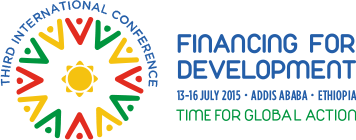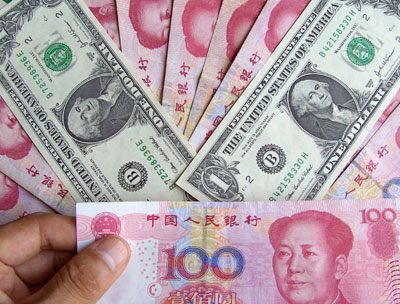 This week, tens of thousands of people are gathering for the development finance summit in Addis Ababa, Ethiopia, in the largest conference Addis has ever hosted. As one of the newest "big overseas lenders," will Chinese banks be represented? My initial scan of the program suggests not. Not a single Chinese entity or individual is listed in the provisional Roundtable program. China's Minister of Finance, Lou Jiwei, will be involved in the third Plenary session, yet there is not a single Chinese representative at any of the official side events. This suggests that there is some way to go before Chinese financiers see themselves as part of the framework of development finance as it has evolved. Is that a good or a bad thing? It depends on how you view that framework and is effect on development, so far.
This week, tens of thousands of people are gathering for the development finance summit in Addis Ababa, Ethiopia, in the largest conference Addis has ever hosted. As one of the newest "big overseas lenders," will Chinese banks be represented? My initial scan of the program suggests not. Not a single Chinese entity or individual is listed in the provisional Roundtable program. China's Minister of Finance, Lou Jiwei, will be involved in the third Plenary session, yet there is not a single Chinese representative at any of the official side events. This suggests that there is some way to go before Chinese financiers see themselves as part of the framework of development finance as it has evolved. Is that a good or a bad thing? It depends on how you view that framework and is effect on development, so far.My post last week on China, Debt, and Human Rights -- inspired by a Voice of America story -- generated some interesting discussion (through emails) suggesting that the Voice of America reporter had not done justice to the material released by Juan Pablo Bohoslavsky, the International Expert on Debt and Human Rights, at his press conference in Beijing. I was urged to read the expert's end of mission statement (preliminary report) itself, released on July 6. It makes interesting reading, for several reasons, including the degree of cooperation from the Chinese government.
Bohoslavsky notes that he received an official invitation for his mission, and that during his week's visit he met with officials in the ministries of Foreign Affairs, Education, Finance, Public Security, Human Resources and Social Security, Housing and Urban-Rural Development, Commerce, the State Council Information Office, the National Health and Family Planning Commission, the People’s Bank of China and the China Banking Regulatory Commission and representatives of the China Development Bank, EXIM Bank China, and the Chinese Enterprises Confederation, including the China Chamber of Metals, Minerals and Chemical Importers and Exporters.
Bohoslavsky also stated that he phrased the dilemma of human rights protection like this:
I posed this question in almost every meeting during this visit: how to reconcile the principle of non-intervention in domestic affairs with the idea of protecting and promoting human rights abroad [emphasis added]? There is in China a sense that this is a delicate, complex but much needed task to be carried out. In my view the solution should be to stress local ownership and the own development priorities of partner countries to achieve social inclusive and sustainable development in line with international human rights standards.Bohoslavsky got the first part of this exactly right. Yet his solution is problematic. Ironically, Chinese banks -- like other export credit agencies and multinational commercial banks -- already stress local ownership and development priorities of partner countries (read: governments). They take a "hands off" approach, providing the finance and expecting the borrower/owner to manage resettlement, compensation, and other thorny issues. Thus, it is very often weaknesses and shortfalls in the borrowers' own systems--under local ownership--that results in aggrieved citizens, who have lost homes and livelihoods without an adequate response from their governments.
The mission was able to pose some tough questions to people in responsible positions. Bohoslavsky noted that on paper, Chinese companies and lenders are supposed to apply standards, for example, on green credit. But he was "informed that so far no sanction has been applied by the Chinese authorities to Chinese lenders and corporations for overseas investments that may have contradicted the Green Credit Guidelines."
It is tough to do interviews on these issues in China. Chinese banks are unlikely to provide examples of their responses to environmental/social issues because they would consider these highly sensitive matters not for discussion with “outsiders” and seen as the internal affairs of the borrowing country. If these issues arose and were dealt with, they would (as Bohoslavsky noted) have been viewed as the borrowing country’s “internal affairs” and this is not something that can be discussed in public. Yet there are some examples in Africa where it appears that Chinese lenders have halted loans, or Chinese companies, adjusted their approaches to mitigate environmental concerns.
According to a fascinating case study published in 2007 by the World Wildlife Fund, engagement among local and international NGOs, Gabon ministries, and a Chinese oil company that was prospecting for oil in a Gabonese national park led to a collaborative effort to mitigate impact.
Peter Bosshard at International Rivers, an activist NGO, wrote an optimistic post in 2010:
… we have witnessed progress on the ground in Gabon. With support from China Exim Bank, Chinese investors plan to develop a huge iron ore deposit in this West African country, complete with a hydropower dam, railway line and port. Brainforest, Gabon’s inspiring environmental NGO, sent a letter to the Exim Bank pointing out that the dam was proposed to be built in a national park, and would violate its environmental guidelines. In due course, Brainforest learned from the Gabonese government that China Exim Bank had suspended the project over environmental concerns. In a separate development, Sinohydro agreed to work together with the Global Environmental Institute, a Chinese NGO, in an effort to address the social and environmental impacts of the Nam Ngum 5 Dam in Laos.
Environmental and social impact of Chinese lending overseas is an important area, but not my own research focus -- so I welcome other case studies, if anyone has them.




